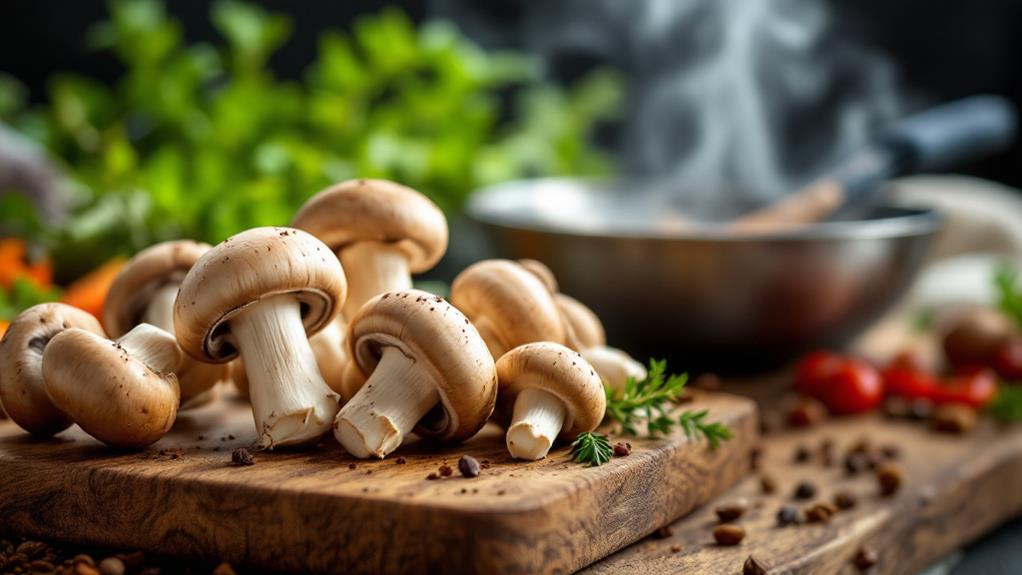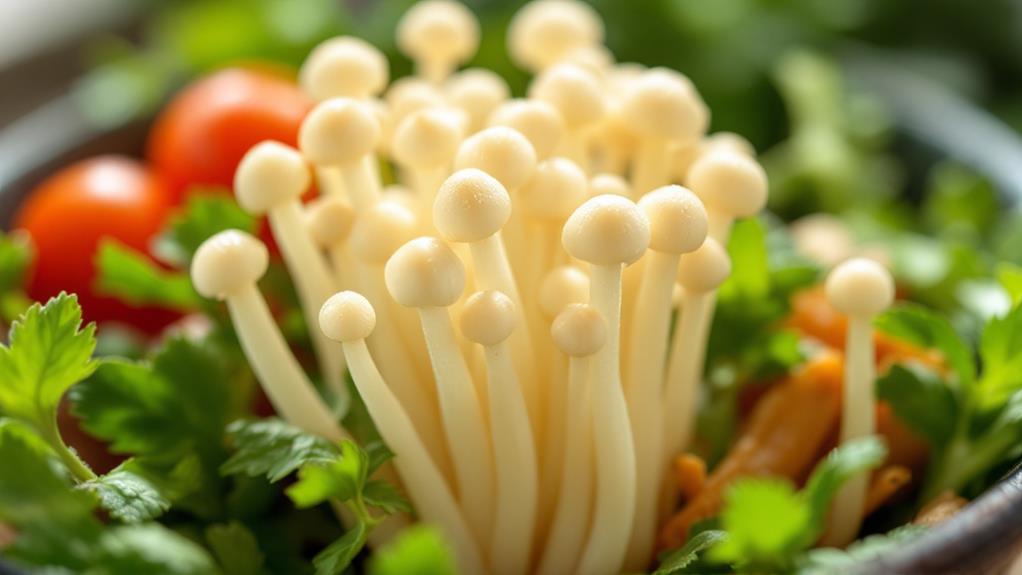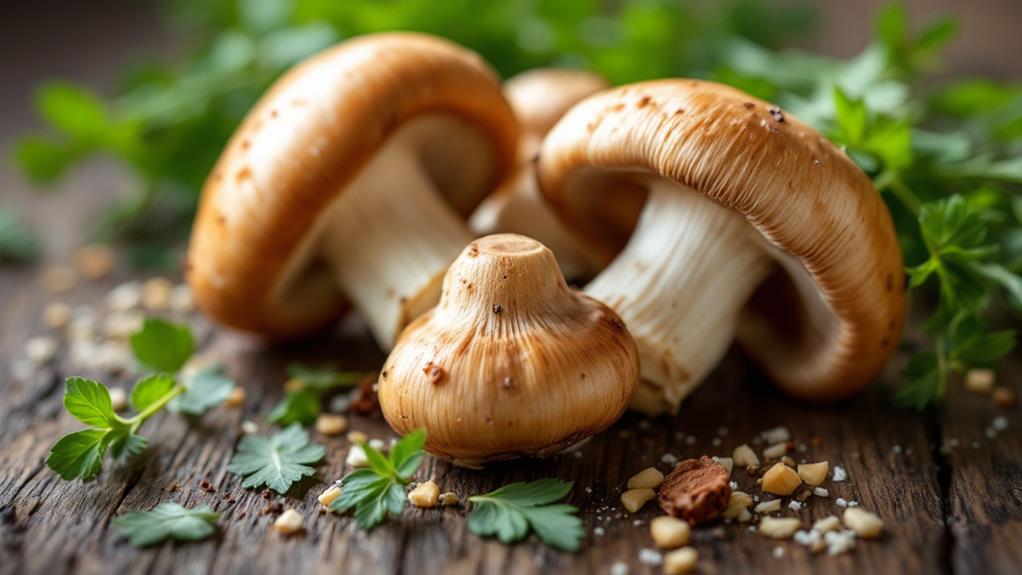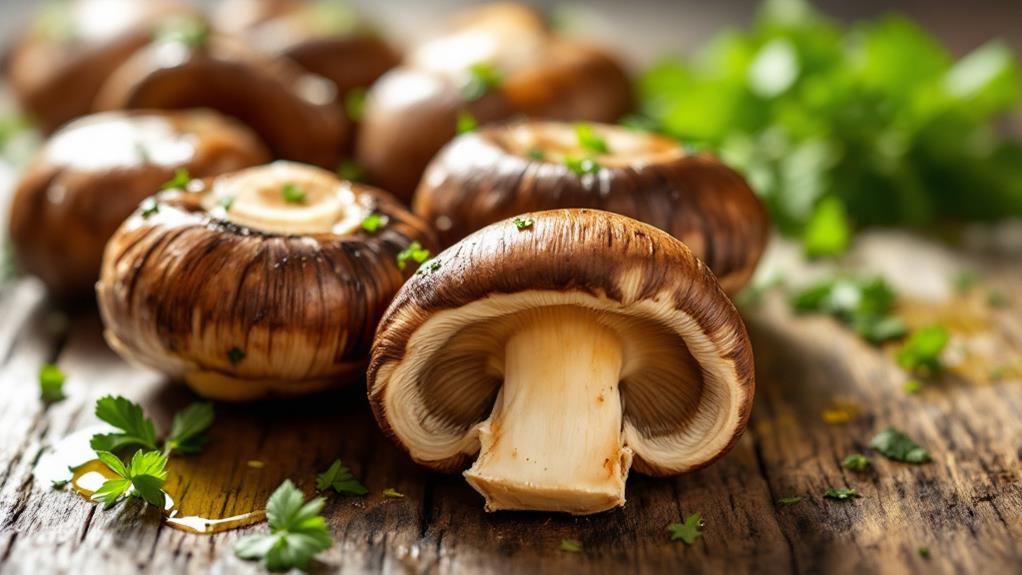Chanterelle Mushrooms: An Introduction and Their Health Benefits
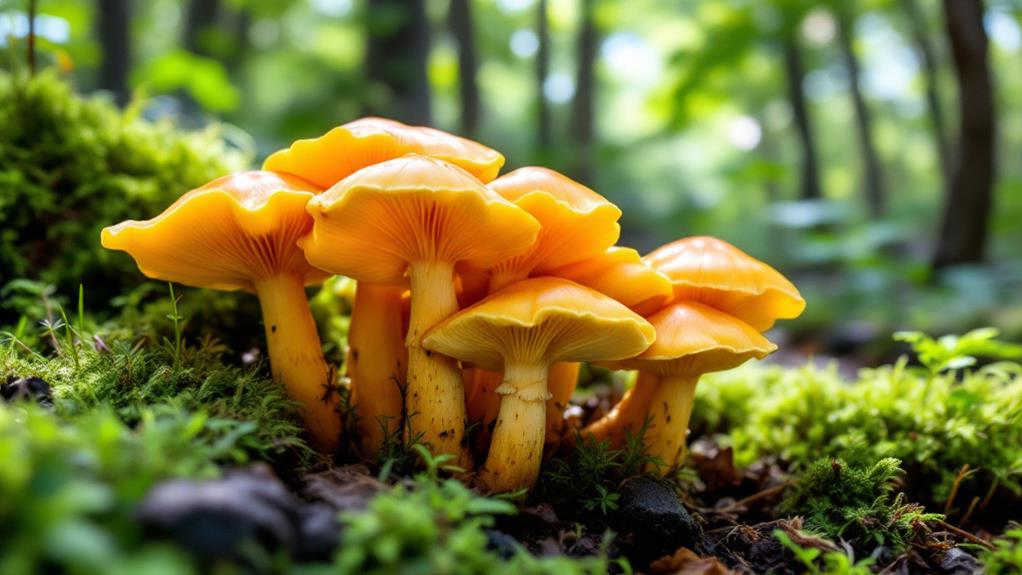
Chanterelle mushrooms, distinguished by their golden hue and fruity aroma, are a culinary delight and health enhancer. Low in calories, these mushrooms are rich in vitamin D, supporting bone health and your immune system. Packed with dietary fiber, they aid digestion and provide vital vitamins and minerals like copper and niacin. These nutrients boost energy production and skin health while fighting oxidative stress with powerful antioxidants. When cooking, their unique flavor shines in creamy sauces or simply sautéed. To safely enjoy, proper identification is essential. Investigate more to uncover their complete benefits and diverse culinary tips.
Understanding Chanterelle Mushrooms
Chanterelle mushrooms, a culinary delight known for their lively golden hue and fruity aroma, are a forager's gem in the lush forests of the Northern Hemisphere. Scientifically referred to as Cantharellus cibarius, these wild edible mushrooms thrive particularly under conifers and oaks. They aren't just a treat for your taste buds but also offer numerous health benefits.
Chanterelles are a powerhouse of nutrition, being low in calories and rich in vitamin D, which is essential for bone health and the immune system. These mushrooms also contain an impressive array of bioactive compounds like polysaccharides and beta-glucans. These compounds improve antioxidant activity in your body, helping to neutralize harmful free radicals and elevate your immune defenses.
When you forage for these mushrooms, proper identification is paramount since they can be easily confused with toxic look-alikes like the jack-o-lantern mushroom. Consuming the wrong species can lead to severe gastrointestinal issues. However, when correctly identified and prepared, chanterelles provide not only a delicious supplement to your meals but also contribute greatly to general health, making them a true gem in the world of wild edible mushrooms.
Nutritional Value
While often celebrated for their culinary appeal, these mushrooms offer impressive nutritional benefits that shouldn't be overlooked. Chanterelle mushrooms are a low-calorie food, with just 17 calories per 1 cup (54 grams). They make a great supplement to any diet, especially if you're watching your calorie intake. Despite their light calorie load, they pack a punch with vital nutrients.
You'll find 1 gram of protein and 4 grams of carbohydrates per serving, which contribute to your daily nutritional needs. These mushrooms are rich in dietary fiber, providing about 2 grams per serving. This fiber content supports digestive health and helps keep you feeling full longer.
Chanterelles are also a significant source of critical vitamins and minerals. Importantly, they provide 21% of your daily value for copper, 14% for niacin, and 14% for vitamin D. Furthermore, they offer pantothenic acid (12% DV), iron (10% DV), riboflavin (9% DV), and manganese (7% DV). These nutrients contribute to multiple health benefits, such as improved skin health, energy production, and immune support. Including chanterelle mushrooms in your diet can be a delicious way to enhance your nutritional intake.
Vitamin D and Bone Health
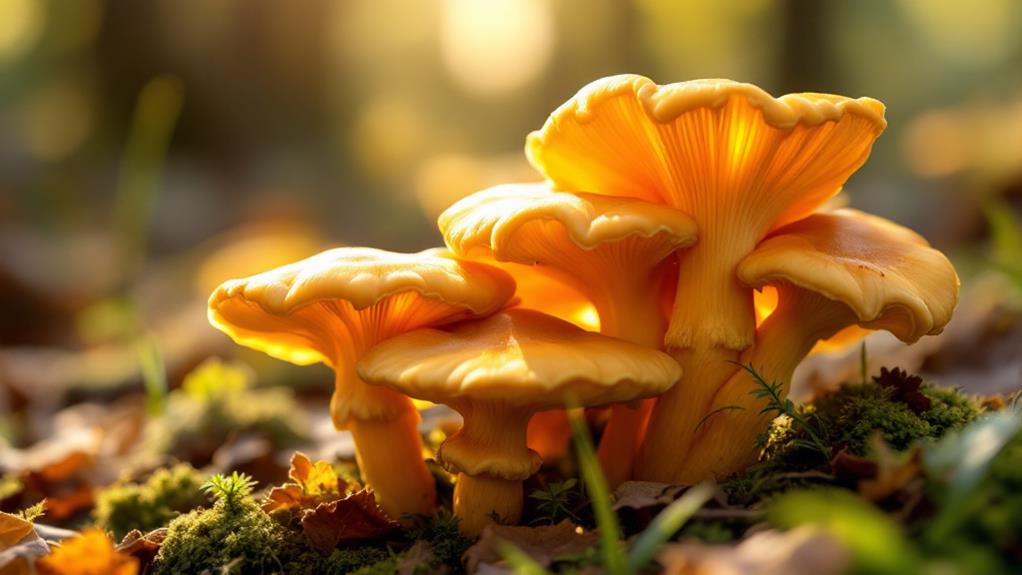
Vitamin D plays an essential role in maintaining bone health, and chanterelle mushrooms are an excellent source of this fundamental nutrient. With wild-harvested varieties containing 5-20 micrograms per half cup, chanterelles bolster your bone health by aiding in calcium absorption. This process is critical in preventing conditions like osteomalacia and osteoporosis, especially as you grow older. By incorporating these mushrooms into your diet, you can effectively support your skeletal health and overall well-being.
Here's why you should consider adding chanterelle mushrooms to your meals:
- Rich in Vitamin D: A single serving offers about 14% of your daily value (DV) for vitamin D, making it a valuable dietary source.
- Boosts Calcium Absorption: Helps your body absorb calcium efficiently, vital for maintaining healthy bone density.
- Reduces Inflammation: Regular consumption of vitamin D-rich foods like chanterelles can help reduce inflammation, further supporting bone health.
- Supports Healthy Bone Density: Adequate vitamin D levels from chanterelles are crucial for preventing fractures and ensuring strong bones.
Immune System Support
A remarkable benefit of consuming chanterelle mushrooms is their support for your immune system. These mushrooms are rich in polysaccharides, which have been shown to improve your immune response by stimulating the production of immune cells. This means your body can better fend off infections and illnesses. Chanterelle mushrooms also contain high levels of vitamin D, a nutrient essential for immune function. Vitamin D helps modulate your immune system, reducing the risk of infections and supporting general health.
Additionally, chanterelles provide a significant amount of copper, about 21% of your Daily Value per serving. Copper plays a key role in the development and activation of immune cells, contributing to your immune system support. The antioxidants present in chanterelles, such as beta-carotene and polyphenols, help combat oxidative stress. While we're focusing on immune health here, it's good to know that these antioxidants also play a role in reducing inflammation.
Regular consumption of chanterelle mushrooms may lead to a stronger immune response and a lower incidence of chronic diseases. By reducing inflammation and promoting general health, chanterelles offer substantial health benefits. Consider adding these delicious mushrooms to your diet to support your immune system.
Antioxidant Benefits
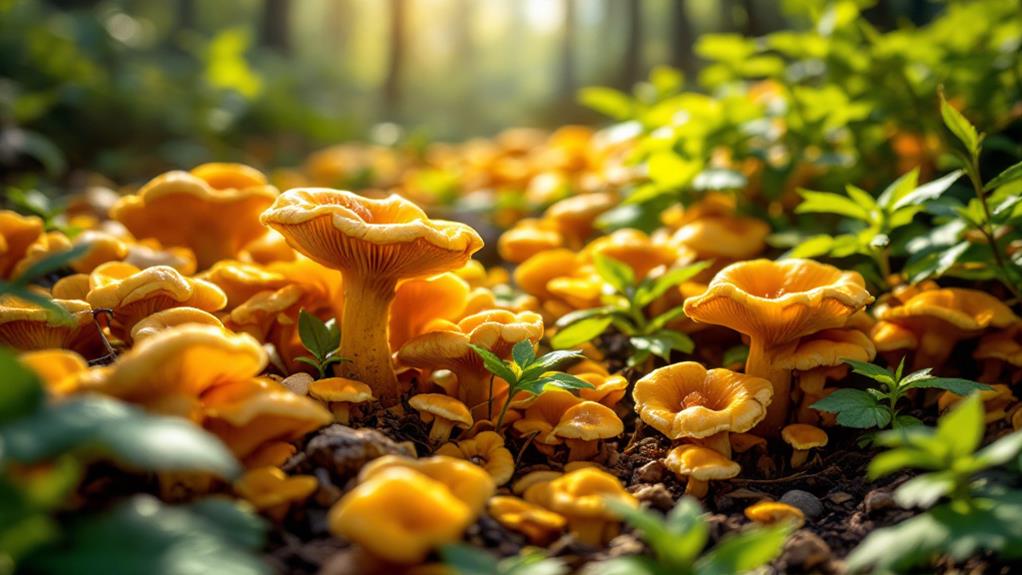
Chanterelle mushrooms pack a powerful punch regarding antioxidant benefits. They're rich in antioxidants like flavonoids and polyphenols, which actively work to combat oxidative stress and reduce inflammation. By incorporating chanterelles into your diet, you can take advantage of their impressive health benefits. Here's what they offer:
- Ergothioneine Protection: This unique antioxidant shields your cells from damage, ensuring comprehensive cellular health.
- Reduced Chronic Disease Risk: The polyphenols in chanterelles may lower your risk of chronic diseases such as heart disease.
- Enhanced Immune Function: Regular consumption of these mushrooms can elevate your immune function, making you less prone to infections.
- Improved Skin Health: Antioxidants in chanterelles can reduce oxidative damage, potentially promoting a more youthful skin appearance.
The high phenolic content in chanterelles not only strengthens your body's defense against oxidative stress but also supports healthy aging. By reducing inflammation, these mushrooms can help maintain a healthy immune system. Additionally, the powerful combination of antioxidants found in chanterelles doesn't just protect against illnesses—they also contribute to skin health, giving you a radiant and youthful glow. Including chanterelle mushrooms in your diet is a delicious way to harness these antioxidant benefits.
Potential Cancer Prevention
While you might already appreciate chanterelle mushrooms for their flavor, their potential role in cancer prevention is likewise compelling. These mushrooms are packed with polysaccharides and bioactive compounds that exhibit potential cancer-fighting properties. By reducing inflammation and oxidative stress, chanterelles may help protect your cells from damage that could lead to cancer. The presence of ergothioneine improves their antioxidant capacity, further defending your cells against harmful changes.
Test-tube studies have shown that extracts from chanterelle mushrooms can have cytotoxic effects on multiple cancer cell lines. This suggests they could have a role in cancer therapy. Additionally, by enhancing your immune function, regular consumption of these mushrooms might lower your cancer risk. Their rich supply of vitamins and minerals supports your body's ability to combat abnormal cells effectively.
Ongoing research continues to investigate how chanterelle extracts work against cancer cells, highlighting their significance in dietary chemoprevention. Including chanterelle mushrooms in your diet could be a proactive step in supporting your health. While more studies are needed to fully understand their impact, the existing evidence points towards their promising role in cancer prevention.
Culinary Uses
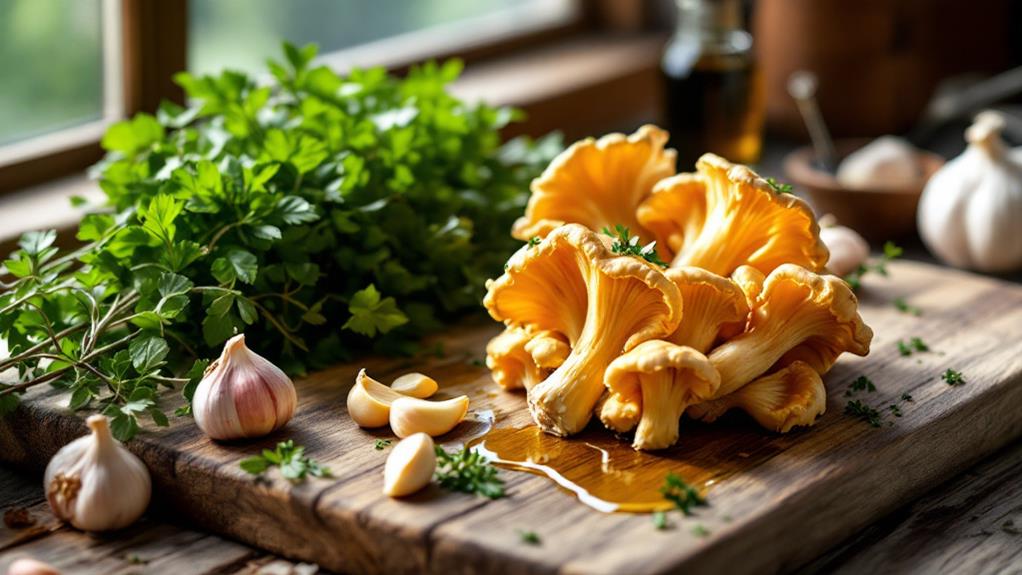
Among the many reasons to love chanterelle mushrooms, their culinary versatility stands out. Their unique taste improves a wide array of dishes, making them a gourmet's delight. Whether you're roasting them or incorporating them into soups, chanterelles offer a delectable experience. Their subtle fruity flavor is perfectly suited for creamy sauces and risottos, elevating the simplest meals to gourmet status.
Chanterelles are a natural partner for earthy vegetables and herbs, bringing out the best in both simple and complex recipes. Their compatibility with diverse ingredients makes them a kitchen staple, regardless of whether you prefer them fresh or dried. When using dried chanterelles, rehydrate them by steeping in hot water to reveal their full flavor potential.
Here's how you can incorporate them into your cooking:
- Sautéed or roasted to bring out their natural sweetness
- Added to soups and stews for a rich, savory depth
- Blended into creamy sauces for an elegant touch
- Combined with earthy vegetables for a wholesome dish
Cooking chanterelles not only improves their unique taste but also amplifies their health benefits, increasing antioxidant activity. So, go ahead and investigate the culinary uses of chanterelles to enrich your dishes.
Safe Foraging Practices
Exploring the culinary wonders of chanterelle mushrooms can be deeply rewarding, but it's important to guarantee you're foraging them safely. Proper identification is imperative because chanterelles can easily be mistaken for toxic species like the jack-o-lantern mushroom. Consuming these can lead to severe gastrointestinal issues, so always verify you're picking the right mushrooms. Use reliable resources such as field identification books, and don't hesitate to consult local guides or experts.
When foraging, choose clean areas far from highways or industrial sites. Mushrooms can absorb contaminants, including heavy metals, which can pose health risks. Confirming your foraging area is uncontaminated is a significant part of safe foraging practices.
Sustainable harvesting is another key aspect. Leave enough mushrooms behind to allow the population to regenerate and thrive, making sure future foragers can also enjoy them. Overharvesting can damage ecosystems and reduce future yields.
If you're new to foraging, consider learning from an experienced mentor. They can help you understand the correct techniques and precautions, enhancing both your skills and safety. By following these guidelines, you can enjoy chanterelles with confidence and responsibility.
Possible Side Effects
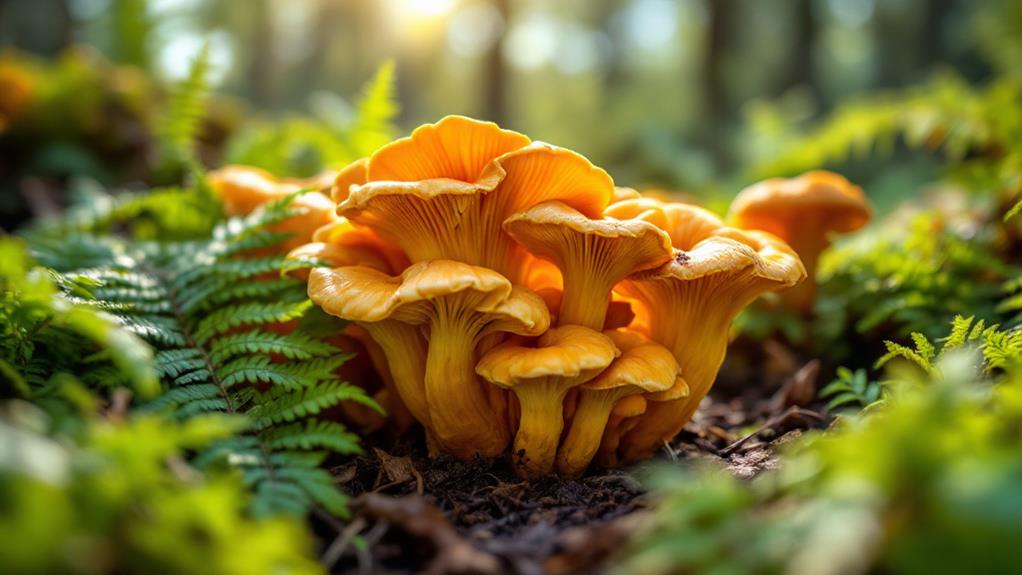
Chanterelle mushrooms can sometimes pose health risks if not handled or consumed properly. One of the main concerns with chanterelle mushrooms is their ability to accumulate heavy metals like cadmium and mercury. Consuming large amounts can lead to serious health issues. As a result, it's significant to be aware of several possible side effects:
- Allergic Reactions: Some people may experience symptoms such as hives, itching, or gastrointestinal distress after consuming chanterelle mushrooms.
- Gastrointestinal Distress: Eating raw or improperly cooked chanterelles can cause nausea and vomiting, which can be unpleasant and potentially dangerous.
- Heavy Metals: These mushrooms can absorb heavy metals from their environment, posing a risk if consumed in large quantities. Using specific cooking methods, like blanching, can help reduce these concentrations.
- Toxic Look-Alikes: Proper identification is vital when foraging. Misidentifying chanterelles with toxic look-alikes, such as jack-o-lantern mushrooms, can result in severe health complications.
To minimize health risks, verify you're identifying chanterelle mushrooms correctly and using appropriate cooking methods. By being cautious and informed, you can enjoy these mushrooms safely. Always consult a healthcare provider if you experience adverse reactions after consumption.
Cooking Tips
In relation to cooking chanterelle mushrooms, a few tips can improve your culinary creations. To begin, to preserve their unique fruity flavor, avoid washing them until you're ready to cook. Use a soft brush to gently remove dirt, preventing spoilage and ensuring maximum taste. When preparing fresh chanterelles, consider dry sautéing them initially. This method removes excess moisture, allowing the mushrooms to develop a concentrated flavor before you add other ingredients.
Chanterelles shine in creamy sauces and risottos, where their texture and taste complement cream-based recipes beautifully. Pair them with earthy vegetables like spinach or asparagus for a rich, satisfying dish. If you're using dried chanterelles, remember they can be rehydrated by steeping in hot water. This process not only brings them back to life but also lets you enjoy their flavor throughout the year.
Roasting or incorporating chanterelles into soups and stews are also excellent ways to reveal their full potential. These methods bring out their nuanced flavors, making your dishes more flavorful. With these cooking tips, you can truly highlight the delightful qualities of chanterelle mushrooms in your kitchen.

